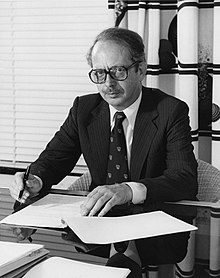Ralf Dahrendorf
|
The Right Honourable The Lord Dahrendorf KBE FBA |
|
|---|---|

Ralf Dahrendorf, photo taken in 1980
|
|
| Member of House of Lords | |
|
In office 15 July 1993 – 17 June 2009 |
|
| Personal details | |
| Born |
1 May 1929 Hamburg, Germany |
| Died | 17 June 2009 (aged 80) Cologne, Germany |
| Nationality | United Kingdom Germany |
| Political party | Liberal Democrats (UK); FDP (Germany) |
| Spouse(s) |
Vera Dahrendorf Ellen Dahrendorf (née Ellen Joan Krug) (1980–2004) Christiane Dahrendorf (2004–2009) |
| Children | Nicola, Alexandra, and Daphne Dahrendorf |
| Alma mater |
University of Hamburg London School of Economics |
| Profession | Sociologist |
| Ralf Dahrendorf | |
|---|---|
| Known for | Providing a new definition of class conflict based on authority relations |
| Influences | Marx, Weber, Popper, Hayek, Kant |
Ralf Gustav Dahrendorf, Baron Dahrendorf, KBE, FBA (1 May 1929 – 17 June 2009) was a German-British sociologist, philosopher, political scientist and liberal politician. A class conflict theorist, Dahrendorf was a leading expert on explaining and analyzing class divisions in modern society, and is regarded as "one of the most influential thinkers of his generation." Dahrendorf wrote multiple articles and books, his most notable being Class Conflict in Industrial Society (1959) and Essays in the Theory of Society (1968).
During his political career, he was a Member of the German Parliament, Parliamentary Secretary of State at the Foreign Office of Germany, European Commissioner for External Relations and Trade, European Commissioner for Research, Science and Education and Member of the British House of Lords, after he was created a life peer in 1993. He was subsequently known in the United Kingdom as Lord Dahrendorf.
He served as director of the London School of Economics and Warden of St Antony's College, University of Oxford. He also served as a Professor of Sociology at a number of universities in Germany and the United Kingdom, and was a Research Professor at the Berlin Social Science Research Center.
Born in Hamburg, Ralf Dahrendorf was the son of Lina and Gustav Dahrendorf, and brother of Frank Dahrendorf. Dahrendorf was known for strongly supporting anti-Nazi activities. As a child, Ralf was a member of the Deutsches Jungvolk, the youngest branch of the Hitler Youth. When Ralf was only a teenager, he and his father, an SPD member of the German Parliament, were arrested and sent to concentration camps for their Anti-Nazi activities during the National Socialist regime. After this his family moved to Berlin. In 1944, during the last year of the second world war, Ralf was arrested for engaging in anti-nazi activities and sent to a concentration camp in Poland. He was released in 1945.
...
Wikipedia
